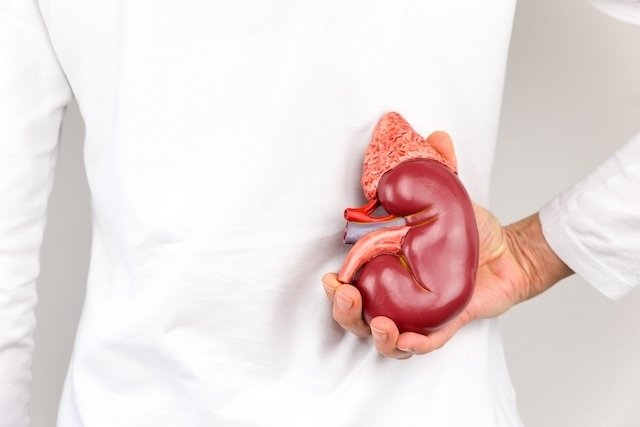A swollen kidney, known scientifically as hydronephrosis, occurs when there is a blockage in the flow of urine in any region of the urinary system, from the kidneys to the urethra. In this way, urine is retained, leading to swelling of the kidney, which can be noticed through some symptoms such as lower back pain, pain and difficulty urinating, nausea, urinary incontinence and fever.
Swelling of the kidneys occurs mainly due to obstruction in the ureter, which can occur due to the presence of tumors, kidney stones, benign prostatic hyperplasia or due to malformations of the urinary system, becoming known as congenital hydronephrosis. Learn more about hydronephrosis.

Swollen Kidney Symptoms
The main symptoms of a swollen kidney (hydronephrosis) are:
- Pain in the kidney region;
- Fever;
- Chills;
- Pain and difficulty urinating;
- Lower back or kidney pain;
- Decrease in urine volume;
- Urine with bright red blood or pink urine;
- Nausea and vomiting;
- Loss of appetite.
In most cases of swelling in the kidneys, no signs or symptoms are observed, however when they appear they vary according to the cause, duration and location of the blockage that gave rise to hydronephrosis.
How to confirm the diagnosis
The diagnosis of a dilated kidney is made by a nephrologist, urologist or general practitioner, who generally requests imaging tests such as ultrasound, computed tomography or magnetic resonance imaging to evaluate not only the kidney, but the entire urinary system. In addition, urine and blood tests are usually requested to check for changes in the urinary system.
Taking care of your health has never been easier!
The doctor may also perform a bladder catheterization, which is a procedure in which a thin tube is inserted through the urethra in order to drain urine. If a lot of urine can drain, it means there is an obstruction and the kidney may be swollen as well.
Main causes
Obstruction in the kidneys that leads to swelling in these organs may be due to the presence of tumors, kidney or ureter stones, the presence of clots and constipation. Furthermore, in men, enlarged kidneys can occur due to an enlarged prostate.
It is also common for women’s kidneys to become swollen during pregnancy, due to the growth of the fetus inside the uterus, which can put pressure on the urinary system and thus prevent the passage of urine, which ends up accumulating in the kidneys. Urinary infections can also cause the kidneys to become swollen, as they can impair the functioning of the ureter.
In some cases, kidney swelling may be present from birth, being due to malformation of the urinary system and, therefore, kidney swelling is said to be congenital.
Treatment for swollen kidney
Treatment for a swollen kidney will depend on its cause, but can be done with medications prescribed by a nephrologist or urologist to alleviate symptoms or prevent infections that are common when the kidney is dilated. Furthermore, in some cases, minor surgery may be indicated to remove accumulated urine and the use of a urinary catheter after the procedure.
Bibliography
- MSD MANUALS – VERSION FOR HEALTHCARE PROFESSIONALS. Obstructive uropathy (Urinary tract obstruction). Available at: <https://www.msdmanuals.com/pt/profissional/dist%C3%BArbios-geniturin%C3%A1rios/urpatia-obstrutiva/urpatia-obstrutiva>. Accessed on March 30, 2020
- NATIONAL KIDNEY FOUNDATION. Hydronephrosis. Available at: <https://www.kidney.org/atoz/content/hydronephrosis>. Accessed on 16 December 2019
- PIÇARRO, Clécio; SILVA, José Maria P.; OLIVEIRA, Eduardo A. Hydronephrosis in children. Rev Med Minas Gerais. Vol 24. 2 ed; 61-65, 2014

Sign up for our newsletter and stay up to date with exclusive news
that can transform your routine!
Warning: Undefined array key "title" in /home/storelat/public_html/wp-content/plugins/link-whisper-premium/templates/frontend/related-posts.php on line 12
Warning: Undefined array key "title_tag" in /home/storelat/public_html/wp-content/plugins/link-whisper-premium/templates/frontend/related-posts.php on line 13




